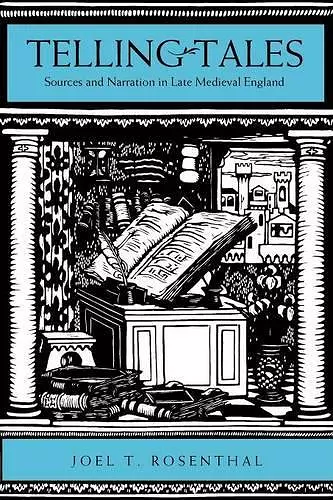Telling Tales
Sources and Narration in Late Medieval England
Format:Paperback
Publisher:Pennsylvania State University Press
Published:15th Oct '12
Currently unavailable, and unfortunately no date known when it will be back
This paperback is available in another edition too:
- Hardback£69.99(9780271023045)

One of the great challenges facing historians of any era is to make the strangeness of the past comprehensible in the present. This task is especially difficult for scholars of the Middle Ages, a period that can seem particularly alien to modern sensibilities. In Telling Tales, Joel Rosenthal takes us on a journey through some familiar sources from fourteenth- and fifteenth-century England to show how memories and recollections can be used to build a compelling portrait of daily life in the late Middle Ages. Rosenthal is a senior medievalist whose work over the years has spanned several related areas, including family history, women’s history, the life cycle, and memory and testimony. In Telling Tales, he brings all of these interests to bear on three seemingly disparate bodies of sources: the letters of Margaret Paston, depositions from a dispute between the Scropes and Grosvenors over a contested coat of arms, and Proof of Age proceedings, whereby the legal majority of an heir was established.
In Rosenthal’s hands these familiar sources all speak to questions of testimony, memory, and narrative at a time when written records were just becoming widespread. In Margaret Paston, we see a woman who helped hold family and family business together as she mastered the arduous and complex task of letter writing. In the knights whose tales were elicited for the Scrope and Grosvenor case, we witness the bonding of men-at-arms in the Hundred Years War. From the Proofs of Age, we have brief tales that are rich in the give-and-take of daily life in the village—memories of baptisms, burials, a trip to market, a fall from a roof, or marriage to another juror’s sister. From a historian at the top of his craft, Telling Tales shows how medievalists can turn scraps of recollection into a synthetic story, one that enables us to recapture the strange and lost country of the European Middle Ages.
“There has been a virtual cottage industry of studies based on the Paston letters, but no one approaches them quite the way Joel Rosenthal does in Telling Tales. With originality and erudition he examines the letters, alongside other key late medieval English texts, and in the process he offers fresh insight into the ‘small narratives’ of ordinary life in late medieval England.”
—L. R. Poos, The Catholic University of America
“Rosenthal’s goal in examining Proof of Age proceedings, depositions in the Scrope/Grosvenor controversy (1386), and Margaret Paston’s letters is to ‘illuminate the social context whence these snippets of memory and communication emanated.’ He also analyzes types of memory and the means by which testators and letter writers gained information. Modes of cognition in Proof of Age depositions and the Scrope testimony are similar: personal knowledge, hearsay, and common fame. Much the same applies to Margaret’s letters. Many Proof of Age witnesses either saw or participated in communal events (e.g., baptism) that helped establish an heir or heiress’s age. If this suggests a bond between the manor house and prominent villages, the Scrope depositions illustrate a strong unity existing among the Scrope men at arms against an adversary. This ‘us versus them’ sentiment is forcefully present in Margaret’s letters, from which we also learn of her duties as mistress of her household and of the responsibilities forced on her by her husband’s frequent absences. In addition, Rosenthal (SUNY Stony Brook) offers an interesting section on the mechanics of composing Margaret’s letters and the means of delivering them.”
—C.L. Hamilton Choice
“Joel T. Rosenthal, a specialist if ever there was one, shows how meaning and interest can be squeezed out of the most unpromising sources.”
—Ad Putter Times Literary Supplement
“In this insightful, closely argued, richly detailed, and very engaging book, Joel T. Rosenthal brings his full attention and considerable intellectual skills to bear on three types of ’so-called lesser sources.'”
—Mark C. Amodio The Medieval Review
“Telling Tales is interesting and lively reading for specialist and general audiences alike. It certainly demonstrates that the documents generated by fairly restricted groups in medieval society (a single family, the landed elite) can be deposed so as to reveal the history of other, more broadly based social groups.”
—Sherri Olson Journal of English and Germanic Philology
ISBN: 9780271058481
Dimensions: 229mm x 152mm x 18mm
Weight: 386g
248 pages